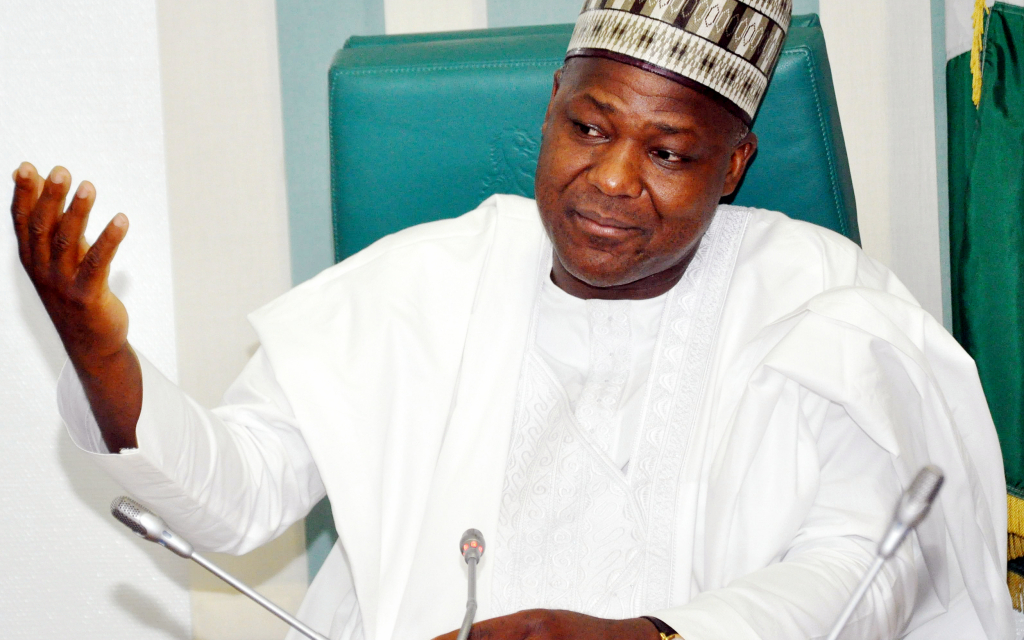By Mohammed Jamu
Ten months after assuming duty as Speaker of the 8th House of Representatives, ebullient Hon Yakubu Dogara has largely demonstrated his dexterity in parliamentary leadership. Since inception June 9, 2015, the House under his watch has remained focused, cohesive, results-oriented and active. The debates during plenary sessions have evidently been all time robust, highbrow and insightful while conscious and firm steps are being taken towards the implementation of the legislative agenda evolved by the House.
The earliest sign that Dogara was indeed the right man for the job of Speaker was evidenced in the sure-footed and decisive measures he took in grappling with the challenge posed by the shove for the principal positions which left the House fragmented. Dogara earnestly and resolutely forged consensus in the manner he accommodated all divides in the sharing formula. This explains the resulting unified climate that has currently enveloped the House
As a responsible leader obviously committed to worthy legacies, he set up an ad hoc committee which he himself was a principal actor to design a legislative agenda for the House, shortly after assumption of duties. The idea essentially was for his leadership and the House to have a legislative road map and a contract with Nigerians which will serve as a basis to evaluating their performance at the end of their tenure.
As Dogara and other lawmakers have observed the pursuit of the legislative agenda would fundamentally enable them to remain focused on critical national matters contained in the agenda which are germane to fast-track the nation’s development. It is also their belief that the legislative agenda makes it easy and quantifiable for the media and the people to hold them accountable and responsible. Unmistakably, such agenda enhances transparency and underpins indices of evaluation
At the presentation of the legislative agenda, a couple of weeks after the inauguration of the House, Dogara established a linkage between the agenda and the promises he made while campaigning for the position of Speaker. According to him, the agenda was a fulcrum of his campaign promises and therefore uniquely structured to enable him lean on it to accomplish his campaign manifestoes. This level of determination and consistency to abide by campaign promises again makes Dogara a rare-bred politician. Besides, the idea of using the agenda as a hub to fulfilling his campaign promises provides a desirable framework for him to succeed as Speaker.
Markedly committed to the articles of the agenda, at any given opportunity Dogara does not fail to highlight its key areas and the direction of his leadership. “The 8th House has the necessary political will and capacity to continue with vigorous oversight of the executive branch as this promotes accountability and reduces incompetence, misuse of government funds and abuse of power. Where necessary, the House shall institute an appropriate system to involve CSOs, citizen monitoring groups, and the media in oversight and evaluation of projects.
“In carrying out its oversight and investigative hearing activities, the House shall ensure that its powers are not misused or abused by either members or committees. To this end, the 8th House shall strengthen its processes, Rules and internal structures to support its oversight and investigating hearing activities and ensure full access to all government financial information”. He stated that the House shall also develop mechanisms to sanction those who do not cooperate with its oversight or investigative activities or who refuse to implement legislative wishes or resolutions,” he said.
In addition, Dogara indicated that the House would be fully pre-occupied towards identifying and amending all obsolete laws in the nation’s statutory books so as to bring them in line with modern democratic principles. As part of the legislative agenda, Dogara has constantly revealed of the tendency of the House under his leadership to legislate so as to propel the growth and sustenance of industry and entrepreneurship.
To demonstrate his commitment towards reviewing the moribund laws, Dogara set up a Special Committee mandated to identifying the obsolete laws for prompt legislative action. The result was the 130 Bills which came for First Reading in one legislative day December 10, 2015 in the House, which progressed into Second Reading in batches. This development clearly made Dogara’s House the first to achieve an ambitious feat of this nature since the inception of the Fourth Republic National Assembly in 1999
This unprecedented feat accordingly earned Dogara Commonwealth’s Honours. The Royal Commonwealth Society Nigeria conferred on the Speaker during the 2016 Commonwealth Day Celebration held at the Sheraton Hotel in Abuja with Commonwealth Ambassador’s Award for leading the legislators to pass 130 bills in a day.
The Vice President of the association, Mr Abdullahi Faruk, stated that the feat was particularly novel. “We looked at how he has, for the very first time, introduced over 100 bills in one day for the legislators to deliberate for the good of Nigerians. It is an all-inclusive kind of governance for Nigerian people and he deserves that recognition and that is why the Commonwealth gave him that recognition.”
Similarly, the thorough manner the House handled the consideration of the 2016 Appropriation Bill is another eloquent testimony to the House’s adherence to its legislative agenda. Understandably, ensuring adequate scrutiny of the executive arm and the fiscal principle towards enhancing government performance is a key focus of the agenda. The House competently identified critical gaps in the budget, in so doing, cutting wastes and taking appropriate steps to filling
Dogara’s Dynamic Leadership and House’s Legislative Agenda

1.3K
previous post


